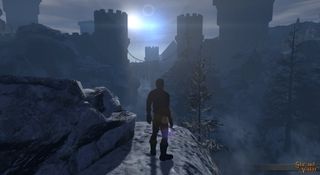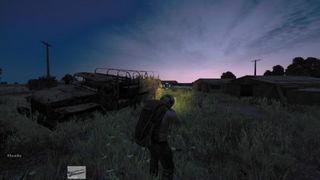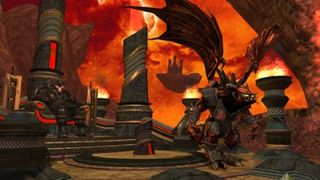Is the MMORPG on the verge of extinction?
Can a spark of originality be glimpsed anywhere?

Ten years ago, you couldn't throw a gnoll without hitting a blockbuster MMORPG. Every fantasy or science fiction brand wanted to be one, and every video game franchise seemed to be turning into one. In my regrettable foray into PR, I even represented a Michael Jackson MMO for a while, which never got anywhere near being made. But The Elder Scrolls got turned into one, Star Trek became one, DC comics became one – Star Wars even got turned into two!
But these days that style of MMORPG seems to be an endangered species, like Black Rhinos or innocent 1970s BBC presenters. Where before we had announcements every few weeks of another multi-million dollar Western MMORPG experiment – Warhammer Online, say, or The Matrix Online – these days we might hear something once every six months.
The focus of the announcements has changed as well. Before they were subscription-based MMOGs, with a substantial pay-up-front element, like World of Warcraft and EverQuest. These days the games are almost always free-to-play, or pay once and play forever, with no brand, whereas the few that stick to the old model come unstuck within a year. Almost every subscription MMO has gone that way: LOTRO, D&D Online, Rift, Defiance, with the relatively new Elder Scrolls Online turning down that same path in recent weeks.

Pushing up DayZ
Indeed, the premium MMOGs that are most successful today are totally different from traditional MMORPGs. Look at the Steam top-selling MMOGs and they're almost entirely survival simulators inspired either by DayZ or Minecraft. Rust, Infestation, H1Z1, Miscreated, and many more follow the lazy DayZ path, almost to the letter. The only aberration is The Crew, Ubisoft's driving MMO.
These games set up a hostile environment where you start with nothing, they make the human players more of a threat than the creatures, they normally give you guns, and they make food and water scarce resources. Though they have RPG mechanics, like inventories, there's no character development and no role to play – these are closer to tactical shooters than to MMORPGs, albeit sometimes with crafting.
So what's the future of MMORPGs going to be like, with such an apocalyptic present? Who might be a reliable prognosticator in this field? I could only think of one person; Richard Garriott, father of the modern MMORPG, having created it with the hugely innovative Ultima Online back in 1997. Garriott is now working on his own Ultima Online tribute, Shroud of the Avatar (pictured at the top of this piece), so understandably he's upbeat.

"The future of MMOs will be great!" he tells me, before immediately adding a caveat. "However, we will see plenty of WOW/EQ clones that will fail along the way. The overused game loop: Create a character, drop into the world, outfit your character, talk to the level 1 quest givers with the '!' over their heads, click on conversation bubbles that won't end until their quest is in your quest log, click on the quest in your quest log, follow the arrow on the map to the quest destination, farm the level 1 creatures with your optimal min-max DPS via your shortcut bar, return to town and repeat… is OVER! Far too many MMOs are largely the same game, with varied graphics."
Get daily insight, inspiration and deals in your inbox
Get the hottest deals available in your inbox plus news, reviews, opinion, analysis and more from the TechRadar team.
Stale formula
He's right, of course – the tightness of the genre is utterly constricting. There are still successful MMORPGs, of course, but they're free-to-play. They're run by companies like GameForge or Nexon, and they tend to be developed in South Korea or China, and follow the formula quite tightly.

Even NCSoft's big budget MMORPGs, the innovative Guild Wars and the pastiche-driven Wildstar, or Funcom's narrative-driven The Secret World, all follow that tight formula. Square Enix's Final Fantasy XIV has even moved from the unusual (admittedly unpopular) innovations of its first incarnation to something that's more cloyingly familiar.
Here's a set of races, and a set of classes, here's a pair of factions, there's an open world with levelled areas, here's crafting, here's harvesting. Here's our large-scale PvP, here's our small-scale PvP. Even with the best will in the world, finding the room to innovate is hard when there are so many boxes to tick and so much to get right.
Most Popular
